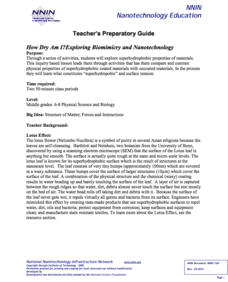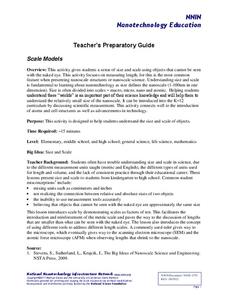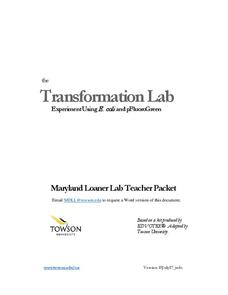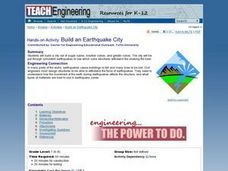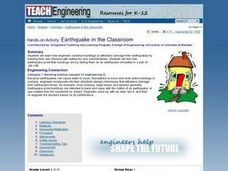Teach Engineering
Egg Drop
Don't drop the ball on the resource ... drop an egg instead! A teacher-led demonstration has the class consider how to drop eggs into glasses when a tray is in the way. Hint: If you've ever seen a magician pull a tablecloth off a table,...
California Academy of Science
Fresh Solutions: Design Thinking Challenge
How do people transport fresh water long distances to ensure everyone has access to it? The final lesson in the 10-part Fresh Solutions unit encourages individuals to design their own solution, or solutions, to that very problem. Groups...
National Nanotechnology Infrastructure Network
How Dry am I? Exploring Biomimicry and Nanotechnology
Help your classes feel like they can walk on water! An engaging inquiry-based lesson has young scholars experiment with different surface coatings. They make observations about their properties and how they relate to the surface tension...
NOAA
To Explore Strange New Worlds
It's time to boldly go where your class has not gone before! The introductory lesson in a five-part series takes young oceanographers aboard the NOAA Ship Okeanos to begin a study of ocean exploration. The lesson includes a comparison of...
National Nanotechnology Infrastructure Network
Scale Models
With instructions to adapt the activities for any grade K-12, any teacher can incorporate the concept of scale into the classroom with a simple, yet effective lesson.
John Wiley & Sons
Build a Pyramid
Learners discover fascinating facts about the Great Pyramid of ancient Egypt and construct a scale model of the pyramid with this fun activity worksheet.
Towson University
Transformation Lab
Transform your class' understanding of genes and antibiotic resistance with the Transformation Lab. Junior geneticists create and observe their own resistant strains of E. coli through research, discussion, and experimentation. The...
National Sailing Hall of Fame
Introduction to Sailboats
The left part of the boat is called what? An informative lesson plan and accompanying slideshow presentation introduce middle schoolers to the terminology and parts associated with a sailboat.
Curated OER
Rock Solid
Young scholars investigate the three types of material stress related to rocks. They watch a PowerPoint Presentation, view an online animation of the three types of rock stress, identify the various types of rocks, answer true or false...
Curated OER
Castles and Fortresses of the World
Students work in groups to study castlers and fortresses of the world. They study pictures and models of well known castles and fortresses. Students construct a 3-D model of a castle or fortress using materials of their choice.
Curated OER
Construct with Solids
Students discover which properties of solids lend themselves to building a tower through hands on trial and error and observation of others as they are building. They write down the steps it took them to build the tower and label an...
Curated OER
Smart Move!
Students visualize a communication system. They encode, decode, transmit, receive and store messages. Students use a code sheet and flashlight for this process. They will also maintain a storage sheet from which they can retrieve...
Curated OER
Construct And Test Roofs for Different Climates
Students investigate what types of roofs are appropriate for various types of climates and environments. They discuss and observe different types of roofs and housing, listen to the book "Houses and Homes," select a region, and design...
Curated OER
Building Your Bridge Building Basics
In this technology worksheet, students examine the basic principles of bridge building design in order to answer the nine questions with the help of the web links on page 2.
Curated OER
Invent a Backscratcher from Everyday Materials
Students explore the design process. They discuss why new products are made, examine backscratchers brought in from home and discuss why it is a useful device, and working with a partner draw and construct a backscratcher.
Curated OER
Galloping Gertie
Students use the internet to discover what a galloping gertie is. After reading an article, they answer questions and view a slideshow of various bridge designs. They examine what happened to the structure when the bridge collasped and...
Curated OER
Design Yer Genes
Seventh graders explore general structure of and natural changes that occur in DNA strands, and discuss concept of genetic engineering by creating small portion of strawberry chromosome with three genes, modeling naturally occurring...
Curated OER
Paper Structures
Students demonstrate that material strength varies with shape and arrangement.
Curated OER
The Squeeze is On
Students investigate the force of compression and how it acts on structural components through a hands-on group project. They use everyday products such as paper, toothpicks, and tape to construct a structure that will support the...
Curated OER
Build An Earthquake City
Students work together to build an earthquake city. They simulate the shaking during an earthquake to discover if their structure is built well enough. They discover how engineers complete these types of tests to develop better...
Curated OER
Earthquake in the Classroom
Young scholars discover how engineers construct buildings to stand up against earthquakes. They build their own structures out of marshmallows and toothpicks. They test how earthquake-proof their building is with jello.
Curated OER
TE Activity: Choosing a Pyramid Site
Students determine how engineers decide on choices for final designs and sites for construction. They look at a surveyor's report while they evaluate sites where a pyramid could be build. They consider the distance the pyramid would be...
Curated OER
TE Activity: Testing Fundamental Loads
Pupils experiment with the five fundamental load types that can act on structures. They use foam insulation blocks to which they apply the forces and draw the fracture patterns. They determine the telltale marks of failure that is caused...
Curated OER
A Place In Space
Students work together to create a 3D coordinate system. They plot points that are given to them and asked to find these points in space. They discover how engineers use coordinates in their careers.




